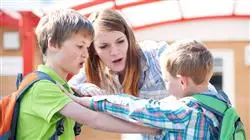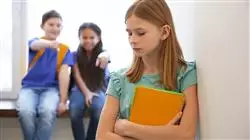University certificate
The world's largest faculty of education”
Introduction to the Program
For the development of this program you will only need a device with an Internet connection"

Students who suffer from mistreatment usually present different behaviors and behaviors that are not easy to identify a priori. These aggressions can be physical, mental, verbal and even sexual and can be caused by any type of person. This is why the field requires professionals with extensive knowledge in the identification and management of risk situations. Therefore, it is necessary to carry out a program such as this, which delves into the preventive aspects and the creation of contingency plans so that together with the institution, the safety and well-being of the student can be guaranteed.
Thus, the development of this degree will allow the teaching professional to delve into aspects such as the intentionality of mistreatment, its repercussions and the mechanisms of action to reduce cases of school abuse. In the same way, the different types of mistreatment and their overcoming from pedagogy will be studied in depth. Therefore, this Postgraduate certificate is presented as an opportunity for the professionals who wish to broaden their outlook and address the needs of the sector, contributing not only to student learning but also to a healthy school coexistence.
As it is a 100% online program, it is nourished with high impact audiovisual material, developed by experts in the field and with a wide variety of practical exercises based on the Relearning methodology. In addition, the teachers will be able to combine their daily work with the academic field at the time of their convenience and from the place that best suits them, without having to attend classes in person.
Go beyond a subject and become a teacher with social commitment thanks to this university program"
This ##ESTUDIO## in Action by Schools in Situations of Child Abuse contains the most complete and up-to-date educational program on the market. IThe most important features include:
- The development of case studies presented by experts in Child Abuse Situations
- The graphic, schematic, and practical contents with which they are created, provide practical information on the disciplines that are essential for professional practice
- Practical exercises where the self-assessment process can be carried out to improve learning
- Its special emphasis on innovative methodologies
- Theoretical lessons, questions to the expert, debate forums on controversial topics, and individual reflection assignments
- Content that is accessible from any fixed or portable device with an Internet connection
With the Relearning methodology you will not need long sessions or hours of extra study, as you will learn through experience and practice"
The program’s teaching staff includes professionals from sector who contribute their work experience to this educational program, as well as renowned specialists from leading societies and prestigious universities.
Its multimedia content, developed with the latest educational technology, will provide the professionals with situated and contextual learning, i.e., a simulated environment that will provide an immersive education programmed to learn in real situations.
The design of this program focuses on Problem-Based Learning, by means of which the professionals must try to solve the different professional practice situations that are presented throughout the academic course. For this purpose, the students will be assisted by an innovative interactive video system created by renowned experts.
This Postgraduate certificate allows you to combine your professional work with the updating of your knowledge, so that you can take it at your convenience"

Implement the knowledge presented in this program into your practice to make it easier for you to identify the type of abuse your student suffers"
Why study at TECH?
TECH is the world’s largest online university. With an impressive catalog of more than 14,000 university programs available in 11 languages, it is positioned as a leader in employability, with a 99% job placement rate. In addition, it relies on an enormous faculty of more than 6,000 professors of the highest international renown.

Study at the world's largest online university and guarantee your professional success. The future starts at TECH”
The world’s best online university according to FORBES
The prestigious Forbes magazine, specialized in business and finance, has highlighted TECH as “the world's best online university” This is what they have recently stated in an article in their digital edition in which they echo the success story of this institution, “thanks to the academic offer it provides, the selection of its teaching staff, and an innovative learning method aimed at educating the professionals of the future”
A revolutionary study method, a cutting-edge faculty and a practical focus: the key to TECH's success.
The most complete study plans on the university scene
TECH offers the most complete study plans on the university scene, with syllabuses that cover fundamental concepts and, at the same time, the main scientific advances in their specific scientific areas. In addition, these programs are continuously being updated to guarantee students the academic vanguard and the most in-demand professional skills. In this way, the university's qualifications provide its graduates with a significant advantage to propel their careers to success.
TECH offers the most comprehensive and intensive study plans on the current university scene.
A world-class teaching staff
TECH's teaching staff is made up of more than 6,000 professors with the highest international recognition. Professors, researchers and top executives of multinational companies, including Isaiah Covington, performance coach of the Boston Celtics; Magda Romanska, principal investigator at Harvard MetaLAB; Ignacio Wistumba, chairman of the department of translational molecular pathology at MD Anderson Cancer Center; and D.W. Pine, creative director of TIME magazine, among others.
Internationally renowned experts, specialized in different branches of Health, Technology, Communication and Business, form part of the TECH faculty.
A unique learning method
TECH is the first university to use Relearning in all its programs. It is the best online learning methodology, accredited with international teaching quality certifications, provided by prestigious educational agencies. In addition, this disruptive educational model is complemented with the “Case Method”, thereby setting up a unique online teaching strategy. Innovative teaching resources are also implemented, including detailed videos, infographics and interactive summaries.
TECH combines Relearning and the Case Method in all its university programs to guarantee excellent theoretical and practical learning, studying whenever and wherever you want.
The world's largest online university
TECH is the world’s largest online university. We are the largest educational institution, with the best and widest online educational catalog, one hundred percent online and covering the vast majority of areas of knowledge. We offer a large selection of our own degrees and accredited online undergraduate and postgraduate degrees. In total, more than 14,000 university degrees, in eleven different languages, make us the largest educational largest in the world.
TECH has the world's most extensive catalog of academic and official programs, available in more than 11 languages.
Google Premier Partner
The American technology giant has awarded TECH the Google Google Premier Partner badge. This award, which is only available to 3% of the world's companies, highlights the efficient, flexible and tailored experience that this university provides to students. The recognition as a Google Premier Partner not only accredits the maximum rigor, performance and investment in TECH's digital infrastructures, but also places this university as one of the world's leading technology companies.
Google has positioned TECH in the top 3% of the world's most important technology companies by awarding it its Google Premier Partner badge.
The official online university of the NBA
TECH is the official online university of the NBA. Thanks to our agreement with the biggest league in basketball, we offer our students exclusive university programs, as well as a wide variety of educational resources focused on the business of the league and other areas of the sports industry. Each program is made up of a uniquely designed syllabus and features exceptional guest hosts: professionals with a distinguished sports background who will offer their expertise on the most relevant topics.
TECH has been selected by the NBA, the world's top basketball league, as its official online university.
The top-rated university by its students
Students have positioned TECH as the world's top-rated university on the main review websites, with a highest rating of 4.9 out of 5, obtained from more than 1,000 reviews. These results consolidate TECH as the benchmark university institution at an international level, reflecting the excellence and positive impact of its educational model.” reflecting the excellence and positive impact of its educational model.”
TECH is the world’s top-rated university by its students.
Leaders in employability
TECH has managed to become the leading university in employability. 99% of its students obtain jobs in the academic field they have studied, within one year of completing any of the university's programs. A similar number achieve immediate career enhancement. All this thanks to a study methodology that bases its effectiveness on the acquisition of practical skills, which are absolutely necessary for professional development.
99% of TECH graduates find a job within a year of completing their studies.
Postgraduate Certificate in Action by Schools in Situations of Child Abuse
If you are interested in the welfare of children and want to have the necessary skills to identify and manage situations of child abuse in different contexts, the Postgraduate Certificate in Action in Schools in Child Abuse Situations is perfect for you. In this 100% online program, you will have the opportunity to learn about the concept and typology of child abuse in all its possible versions. You will learn to recognize the consequences of child abuse, its consequences on development and behavior. In addition, you will be able to identify and know how to implement protocols for the detection of child abuse in different contexts, which will allow you to act effectively in case a situation arises. You will also learn to identify and know how to act in situations of peer abuse in the school context. This knowledge is especially important for those working in the educational field, as they will be able to detect and address situations of bullying and other forms of violence among students.
You will discover new approaches to situations of child abuse
Another important topic addressed in this course is child to parent violence. Here, you will be able to recognize the possible causes and acquire intervention strategies to address this issue. In addition, you will learn how to establish criteria for intervention and coordination of cases, including available resources, the institutions involved, the family and teachers. In detail, if you are passionate about caring for children and wish to acquire skills in the detection and management of child maltreatment situations, the Postgraduate Certificate in Performance of Schools in Child Abuse Situations is perfect for you. Enroll now and start your path to a rewarding and purposeful career!







